Spot Color Screen Printing si distingue come uno dei modi più affidabili per ottenere design croccanti e vibranti. Perfetto per il branding e i materiali promozionali, È noto per la sua precisione e capacità di rendere i colori pop. Sia che tu stia lavorando sull'abbigliamento, segnaletica, o stampe personalizzate, Questo metodo offre risultati coerenti ogni volta.
Curioso di sapere come funziona o perché è così popolare? In questa guida, Ci immergeremo nei dettagli, scoprire i suoi vantaggi unici, e confrontalo con altri metodi di stampa per aiutarti a decidere se è la scelta giusta per il tuo progetto.
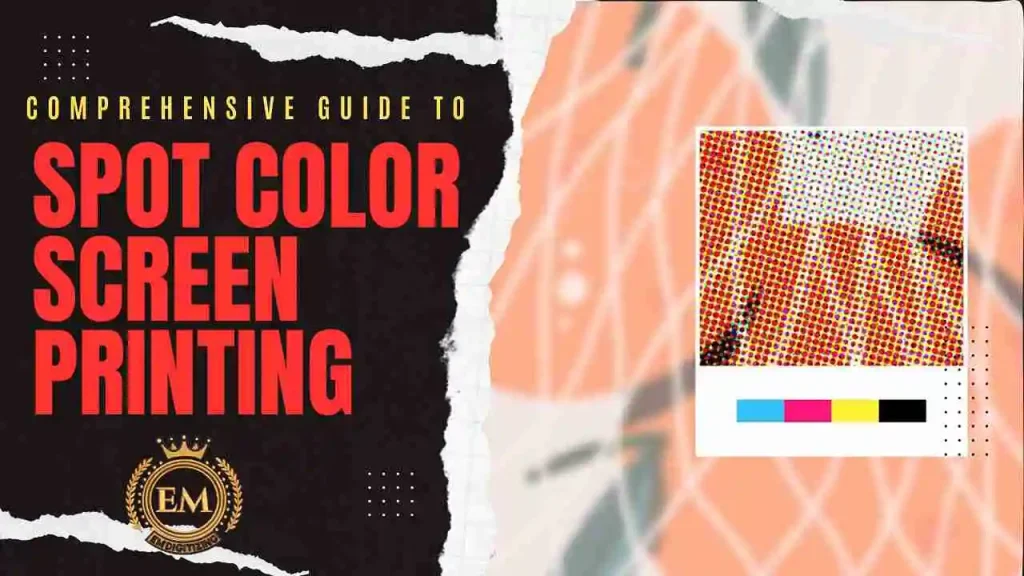
Guida completa alla stampa serigrafica a colori spot
Cos'è il colore spot nella stampa dello schermo?
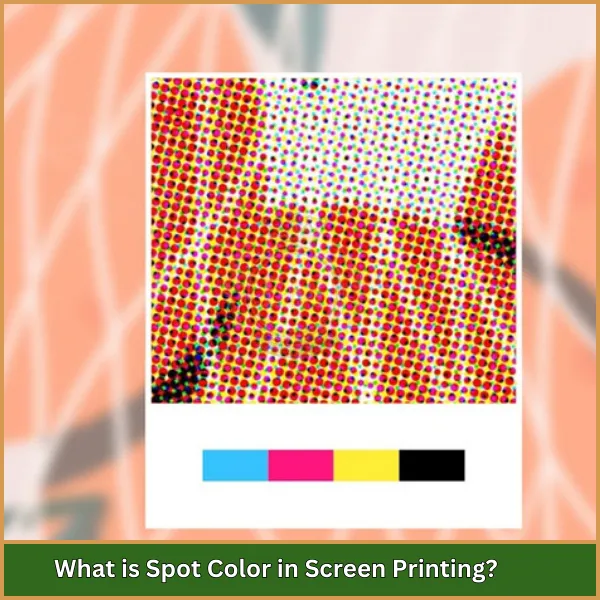
Si riferisce a un metodo in cui specifico, I colori pre-miscelati di inchiostro vengono applicati direttamente alla stampa, Senza fusione o ombreggiatura. Ogni colore è stampato nella sua forma pura attraverso schermi separati, Creare acuto, vibrante, e design coerenti, in genere utilizzato per i loghi, testo, o semplice grafica.
Vantaggi della stampa a colori spot
- Produce vivace, Colori coerenti con inchiostri pre-miscelati.
- Economico per semplici design con meno colori.
- Gli inchiostri ad alta apertura garantiscono un'eccellente copertura, Anche su superfici scure.
- Abilita una corrispondenza precisa del colore, essenziale per loghi e branding.
- Ideale per la stampa di massa, Mantenere l'uniformità tra grandi quantità.
- Processo di installazione più semplice rispetto ai metodi di stampa complessi.
Limitazioni della stampa a colori spot
- Limitato ai colori solidi; Non è adatto per gradienti o disegni foto-realistici.
- Costi più elevati e tempo di configurazione per progetti multicolori o dettagliati.
- Richiede tempo per ordini di stampa piccoli o singoli.
- Richiede un allineamento dello schermo preciso per evitare la mal di registrazione.
- I dettagli fini potrebbero non essere così affilati o chiari nei colori spot solidi.
- Gli inchiostri tradizionali possono avere un impatto ambientale più elevato senza uno smaltimento adeguato.
Come la stampa a colori spot è diversa dall'altra stampa
Quando si confronta CMYK vs Spot Stampa sullo schermo a colori, La differenza chiave sta nel modo in cui i colori vengono creati e applicati. La stampa a colori spot utilizza pre-miscelato, inchiostri solidi per ottenere colori precisi e vibranti, rendendolo ideale per i design che richiedono una corrispondenza esatta del colore, come loghi e branding. Ogni colore viene applicato singolarmente, Garantire coerenza e chiarezza, Soprattutto per semplici design con colori limitati.
In contrasto, CMYK Printing fonde quattro colori di base: lattine, magenta, giallo, e nero: produrre un ampio spettro di colori. Mentre CMYK è più versatile per le immagini e i gradienti foto-realistici, A volte può non essere all'altezza del raggiungimento di toni coerenti e vividi per colori specifici. Spot Color Printing, perciò, Si distingue in scenari in cui l'accuratezza del colore e la vitalità non sono negoziabili.
Materiali e strumenti necessari per la stampa sullo schermo a colori spot
Per ottenere risultati di alta qualità nel colore della stampa dello schermo, È essenziale avere i materiali e gli strumenti giusti che garantiscono stampe di precisione e vibranti.
Materiali
- Schermi: Schermate pre-preparate o pre-rivestite con il conteggio delle mesh appropriato per il design.
- Inchiostri a colori: Plastisol pre-miscelato o inchiostri a base d'acqua per l'applicazione di colore solido.
- Emulsione: Rivestimento sensibile alla luce applicata sugli schermi per la creazione di stencil.
- Film di stencil (Opzionale): Alternativa all'emulsione per design più semplici.
- Substrato: Articoli su cui stampare, come le magliette, carta, o altri materiali.
- Spatole: Usato per spingere l'inchiostro attraverso lo schermo sul substrato.
- Professione di sostanze chimiche: Degreasers, Emulsion Removers, e detergenti a inchiostro per mantenere gli schermi.
Utensili
- Macchina da stampa serigrafica: Una pressa manuale o automatica per contenere schermate e garantire una registrazione precisa.
- Unità di esposizione: Equipaggiamento per indurimento emulsione sugli schermi usando la luce UV.
- Essiccatore flash: Utilizzato per curare l'inchiostro tra strati o asciugatura parzialmente sotto stampe di base.
- Pressa di calore o asciugatrice: Per curare pienamente inchiostri e garantire la durata.
- Guide di registrazione: Strumenti per allineare gli schermi accuratamente per le stampe multicolori.
- Software di progettazione: Programmi come Adobe Illustrator o CorelDraw per la creazione di separazioni di colori spot.
Qual è il processo di stampa a colori spot?
Il Spot Color Process in Screen Printing implica attentamente i seguenti passaggi per garantire vibranti, affilato, e stampe accurate usando solido, Inchiostri pre-miscelati. Questo metodo è Ideale per i design con colori definiti, come loghi o testo.
Fare un passo 1: Preparazione del disegno
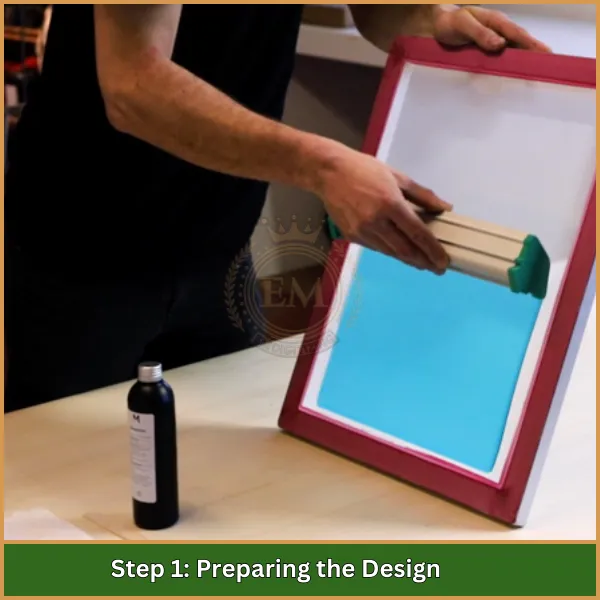
Il processo inizia con la creazione di un design su misura per la stampa a colori spot.
- Usa software di progettazione come Adobe Illustrator o CorelDraw per separare l'opera d'arte in distinti colori a punti.
- Assicurarsi che ogni colore sia etichettato e preparato come livello o file separato.
- I disegni a colori spot non dovrebbero includere gradienti o ombreggiature ma concentrarsi su blocchi di colore solidi.
Fare un passo 2: Creazione dello schermo dello schermo
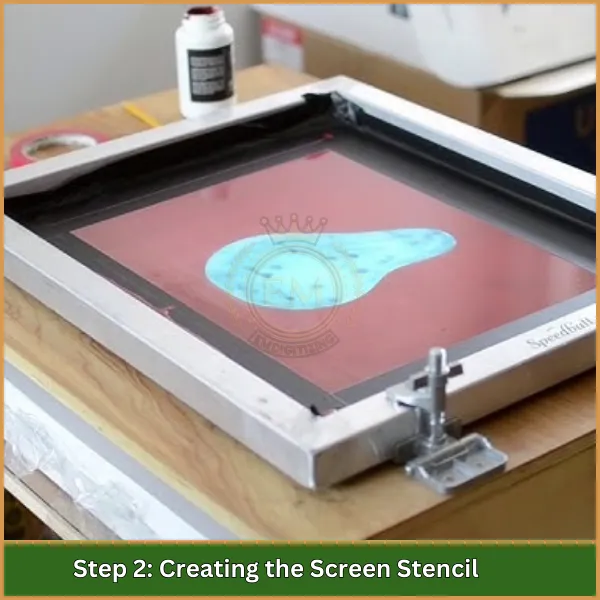
E stencil, o schermo, è pronto a trasferire ogni colore spot sul substrato.
- Applicare uno strato di emulsione sensibile alla luce in modo uniforme sullo schermo usando un coater scoop.
- Posizionare il design (Stampato su un film trasparente) sullo schermo ed esporlo alla luce UV.
- La luce indurisce l'emulsione tranne dove il design la blocca, Lasciando l'area dello stencil.
- Sciacquare lo schermo con acqua per lavare via l'emulsione non esposta, rivelando il design.
Fare un passo 3: Impostazione della pressione della stampa schermata
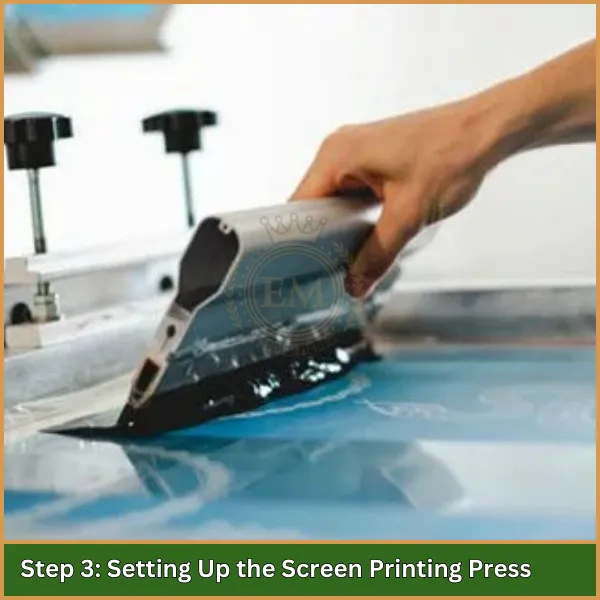
Il corretto allineamento è fondamentale per la stampa spot multicolori.
- Fissare lo schermo alla pressione della stampa schermata.
- Utilizzare guide o segni di registrazione per garantire che ogni schermo si allinei perfettamente per le stampe multi-colore.
- Controlla l'allineamento con le stampe di prova prima di procedere al lotto completo.
Fare un passo 4: Applicazione dell'inchiostro
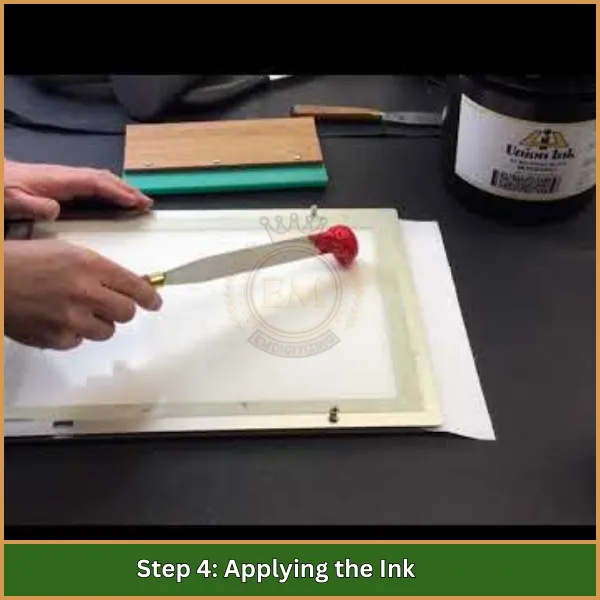
Questa è la fase di stampa, dove ogni colore spot viene trasferito al substrato.
- Applicare l'inchiostro a colore spot scelto sullo schermo.
- Usa uno spremuto per spingere l'inchiostro attraverso lo stencil sul substrato con un movimento uniforme.
- Ripeti il processo per ogni colore, pulire o sostituire gli schermi tra i colori, se necessario.
Fare un passo 5: Curanti l'inchiostro
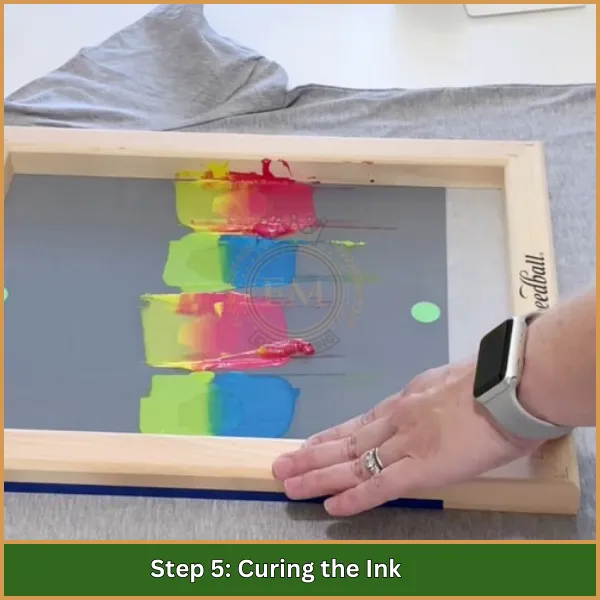
La cura assicura che l'inchiostro aderisce permanentemente al substrato.
- Utilizzare un essiccatore flash per indurimento parziale tra strati di inchiostro nei disegni multicolori.
- Cure completamente il design finale con una pressa di calore o un asciugatrice, in genere a 320 ° F. (160° C.) Per inchiostri di plastisolo.
Fare un passo 6: Pulizia e riutilizzo degli schermi

Dopo la stampa, Gli schermi devono essere puliti e conservati correttamente per un uso futuro.
- Rimuovere l'inchiostro in eccesso con uno screening.
- Applicare un rimodellamento di emulsione per sciogliere lo stencil e ripristinare lo schermo.
- Risciacquare accuratamente e consentire agli schermi di asciugare in un ambiente pulito.
Applicazioni di stampa a colori spot
È una tecnica versatile nota per la sua capacità di fornire output di colori precisi e vibranti. È ampiamente applicato in vari campi per garantire risultati professionali e accattivanti. Ecco dove brilla:
- Biglietti da visita professionali: La stampa a colori spot garantisce che le tonalità specifiche del marchio siano perfettamente abbinate, Creazione di biglietti da visita eleganti e professionali.
- Carta intestata e cancelleria personalizzate: La coerenza è la chiave per il branding aziendale, e i colori spot garantiscono l'uniformità in tutti i materiali per ufficio.
- Buste con marchio: L'uso dei colori spot sulle buste migliora il fascino visivo e rafforza l'identità del marchio.
- Garanzia di marketing: Dalle brochure ai volantini, Spot Color Printing mette in evidenza sezioni importanti, Far distinguere i materiali promozionali.
- Confezionamento del prodotto: Raggiungere ricchi, Colori coerenti sull'imballaggio sono fondamentali per il riconoscimento del marchio, Rendere il colore della stampa di un top scelta.
- Merce e omaggi: Loghi e disegni su oggetti come tote borse e magliette pop vividamente con la stampa a colori spot.
- Stampe d'arte esclusive: Gli artisti usano spesso i colori spot per edizioni limitate per mantenere l'originalità e l'accuratezza del loro lavoro.
- Segni e display: Quando la visibilità e la chiarezza sono fondamentali, La stampa a colori spot offre audace, segnaletica sorprendente.
Linee di fondo
Spot Color Screen Printing è il metodo preferito per produrre Bold, vibrante, e design precisi, Soprattutto per i loghi, Grafica semplice, e progetti che richiedono un'eccezionale accuratezza del colore. Questo processo specializzato assicura che ogni colore sia perfettamente abbinato, Fornire risultati nitidi e coerenti.
Per Servizi artistici vettoriali professionali, EMdigitizing è qui per aiutarti! Il nostro team offre soluzioni di vettorializzazione di alta qualità e convenienti su misura per le tue esigenze. Più, I nuovi clienti ricevono un esclusivo 50% sconto sul loro primo ordine. Non perdere questa offerta a tempo limitato: fai uscire oggi ed eleva i tuoi progetti con i nostri servizi di esperti!
